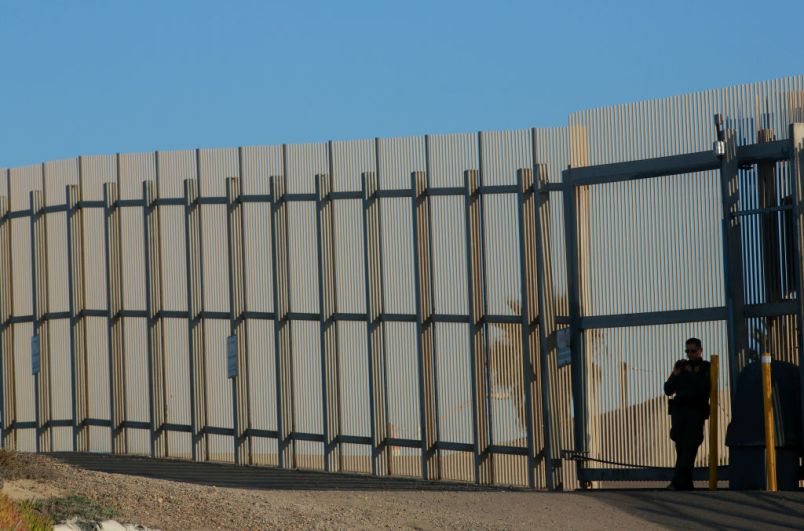OMAHA, Neb. (AP) — A tiny Nebraska startup awarded the first border wall construction project under President Donald Trump is the offshoot of a construction firm that was sued repeatedly for failing to pay subcontractors and accused in a 2016 government audit of shady billing practices.
SWF Constructors, which lists just one employee in its Omaha office, won the $11 million federal contract in November as part of a project to replace a little more than 2 miles (3.2 kilometers) of a current fence with post-style barriers 30 feet (9.1 meters) high in Calexico, California. The project represents a sliver of the president’s plan that was central to his presidential campaign promise for a wall at the border with Mexico.
It remains unclear why SWF was listed on the bid for the wall contract instead of Edgewood, New York-based Coastal Environmental Group, which online government documents list as its owner.
Thomas Anderson, an Omaha lawyer who initially represented a subcontractor that sued Coastal in 2011, said he wouldn’t be surprised if it was an attempt to dodge scrutiny of past legal problems. He says such a practice is relatively common in construction projects.
“If you kick up a little dust on the trail, it makes the trail harder to follow,” Anderson said.
Richard Silva, who is listed in government documents as the primary contact for both SWF and Coastal, did not return numerous phone and email messages left by The Associated Press seeking comment. Messages left with a general voicemail box for Coastal also were not returned.
The U.S. Army Corps of Engineers in Fort Worth, Texas, bid the Calexico wall project, according to federal records. The agency told The Associated Press that by Thursday afternoon it would provide information on the process used to vet SWF. It didn’t immediately return a follow-up call Friday seeking that information.
In 2011, the federal government sued Coastal on behalf of Anderson’s client as part of a multimillion-dollar lead cleanup project at an EPA Superfund site in northeast Omaha. The lawsuit accused Coastal of failing to pay the subcontractor, Enviroworks Inc., nearly $400,000 in labor and equipment costs and of reneging on a profit sharing agreement that cheated the subcontractor out of about $1.7 million.
Government lawyers said Coastal’s refusal to pay forced the subcontractor to lay off most of its employees. Immediately after employees were notified of the layoffs, the lawsuit alleged, “Coastal hired and used the Enviroworks employees as its own and continued to perform the work that Enviroworks was entitled to do,” the lawsuit alleged.
The lawsuit was settled in 2015 for an undisclosed amount.
In 2014, Coastal was again sued by the federal government for failing to pay another subcontractor, SF Marina Systems of Gloucester, Virginia, more than $175,000 for construction of concrete docks at the U.S. Coast Guard facility at Fire Island, New York.
The government said that after repeated requests for payment, Coastal sent SF Marina a photocopy of a check for payment in full, along with a “release and waiver of lien” that Coastal said had to be signed before the check could be sent. But when SF Marina returned the signed release, Coastal still refused to pay and attempted to rely on the signed release to claim SF Marina could not collect on the debt. The lawsuit was settled in 2015, also for an undisclosed amount.
A year later, an audit by the U.S. Interior Department found $2 million in questionable spending that should have flagged it as a problem company, but did not.
That audit looked at billing by Coastal Environmental for work to clean up two wildlife refuges in the wake of Superstorm Sandy. The report found that Coastal billed the U.S. Fish and Wildlife Service for labor and material, subcontractors, lodging and meals and miscellaneous items without providing supporting documents like timesheets, invoices and receipts.
Nancy DiPaolo, with the Interior Department’s Office of the Inspector General, said the department negotiated the repayment of the audit’s findings to $200,000, and Coastal was given five years to pay it back.
The audit’s findings required the Interior Department to file a “past performance report” on Coastal that would have flagged it to other government departments, DiPaolo said. But that report was never filed, she said, for reasons she didn’t know.
“It was probably an oversight,” she said.
Coastal’s new Omaha company, SWF, is not registered with either the Nebraska Secretary of State’s office or the Nebraska Department of Labor, which is required for any company doing business within the state. Labor department officials are investigating whether SWF violated state registration requirements.







Doesn’t even move the meter…
I wonder if the executive vice president’s name is Eric?
Truly shocking…
https://www.youtube.com/watch?v=HMIyDf3gBoYI bet if you look far enough Jared’s 3rd cousin is in there someplace
Another that doesn’t move the surprise meter (insider trading):
Trump confidant Carl Icahn dumped $31.3 million of crane builder Manitowoc stock (dependent on cheap steel) about a week before Trump announced Steel tariffs. Manitowoc stock took a dive after the announcement. Icahn had not bought or sold Manitowoc stock for several years prior.